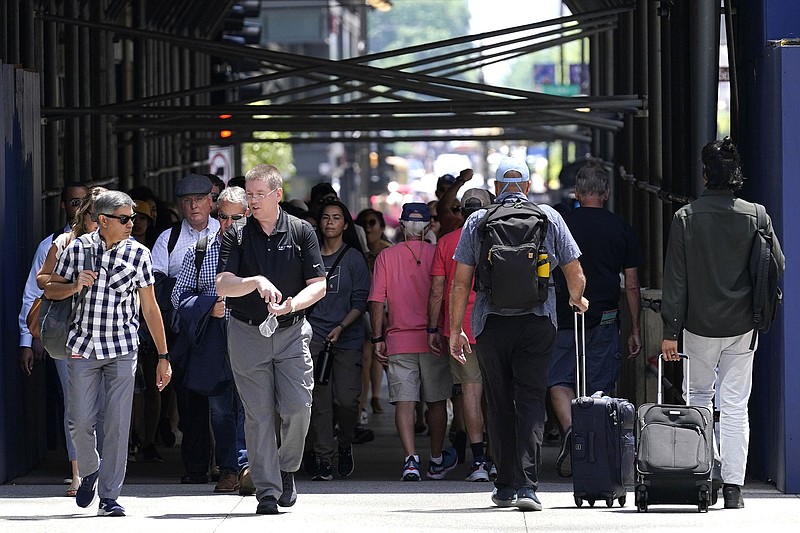Medical experts warn that repeat infections are getting more likely as the pandemic drags on and the virus evolves -- and some people are bound to get hit more than twice. Emerging research suggests that could put them at higher risk for health problems.
There's no comprehensive data on people getting covid-19 more than twice, although some states collect information on reinfections in general. New York, for example, reports around 277,000 reinfections out of 5.8 million total infections during the pandemic. Experts say actual numbers are much higher because so many home covid-19 tests go unreported.
Several public figures have recently been reinfected. U.S. Health and Human Services Secretary Xavier Becerra and Canadian Prime Minister Justin Trudeau said they got covid-19 for the second time, and U.S. Sen. Roger Wicker of Mississippi said he tested positive a third time. All reported being fully vaccinated, and Trudeau and Becerra said they'd gotten booster shots.
"Until recently, it was almost unheard of, but now it's becoming more commonplace" to have covid-19 two, three or even four times, said Dr. Eric Topol, head of Scripps Research Translational Institute. "If we don't come up with better defenses, we'll see much more of this."
Immunity from past infections and vaccination wanes over time, experts say, leaving people vulnerable.
Also, the virus has evolved to be more contagious. The risk of reinfection has been about seven times higher with omicron variants compared with when delta was most common, research out of the United Kingdom shows. Scientists believe the omicron mutants now causing the vast majority of U.S. cases are particularly adept at getting around immunity from vaccination or past infection, especially infection during the original omicron wave. U.S. health officials are mulling whether to modify boosters to better match recent changes in the coronavirus.
Scientists don't know exactly why some people get reinfected and others don't, but believe several things may be at play: health and biology, exposure to particular variants, how much virus is spreading in a community, vaccination status and behavior. British researchers found people were more likely to be reinfected if they were unvaccinated, younger or had a mild infection the first time.
Scientists also aren't sure how soon someone can get infected after a previous bout. And there's no guarantee each infection will be milder than the last.
"I've seen it go both ways," said Dr. Wesley Long, a pathologist at Houston Methodist. In general, though, breakthrough infections that happen after vaccination tend to be milder, he said.
Doctors said getting vaccinated and boosted is the best protection against severe covid-19 and death, and there's some evidence it also lessens the odds of reinfection.
At this point, there haven't been enough documented cases of multiple reinfections "to really know what the long-term consequences are," said Dr. Peter Hotez, dean of Baylor University's tropical medicine school.
But a large, new study using data from the U.S. Department of Veterans Affairs, which hasn't yet been reviewed by scientific peers, provides some insight, finding that reinfection increases the risk for serious outcomes and health problems such as lung issues, heart disorders and diabetes compared with a first infection. The risks were most pronounced when someone was ill with covid-19, but persisted past the acute illness as well.
PANEL FAVORS OMICRON BOOSTERS
Meanwhile, an expert committee recommended Tuesday that the Food and Drug Administration plan for updated coronavirus booster shots targeting some form of the omicron variant that has dominated for months.
The panel's vote paves the way for the FDA to push manufacturers to make reformulated boosters in time for the Biden administration to offer them later this year, before an expected winter surge of the virus.
The decision came after a day of hand-wringing about where the virus is headed next and how best to confront it. A top FDA official called it "science at its hardest." One committee member described the data as "uncomfortably scant."
And a top official from one of the vaccine manufacturers, Moderna, told the panel that his company would not be able to make the type of doses that the regulators appear to favor until late October or early November, assuming "no data to assess the vaccine at all."
Despite all the uncertainties, the panel came down 19-2 in favor of redesigning booster shots to also target omicron or its subvariants, rather than simply the original version of the virus.
The committee debated but did not specify which formulation might work best. The FDA was clearly leaning toward a combination of the existing vaccine and one tailored to two subvariants of omicron, BA.4 and BA.5. According to new estimates from the Centers for Disease Control and Prevention, those subvariants together now make up more than half of new cases in the country.
Justin Lessler, a public health researcher with the University of North Carolina at Chapel Hill, presented a series of worrisome projections on the U.S. trajectory of the virus. Under the most optimistic scenario, his team anticipated 95,000 deaths in the 12-month period ending March 2023. Under the most pessimistic scenario, the nation would see over 200,000 deaths.
Although the overall death rate is low compared with earlier in the pandemic, CDC officials said Americans ages 70 and older have driven increases in hospitalizations. Heather Scobie, an agency public health researcher, said that despite "rather poor" uptake, second boosters were reducing the risk of death in older adults and that health officials should "be pushing the second boosters in older ages to protect against serious illness."
Information for this article was contributed by Laura Ungar of The Associated Press and Sharon LaFraniere and Noah Weiland of The New York Times.
